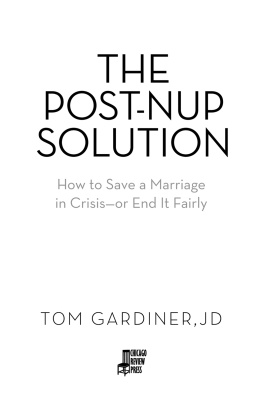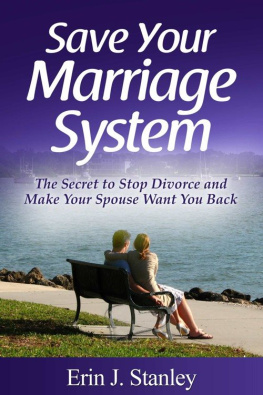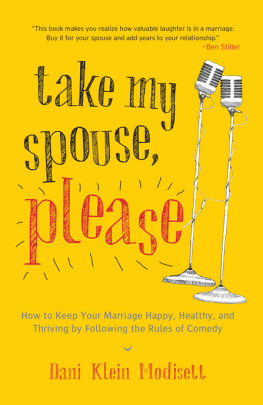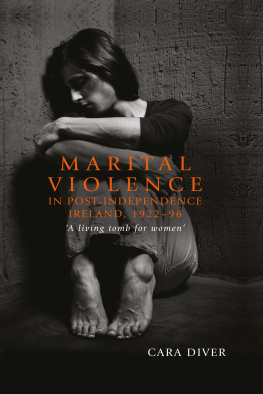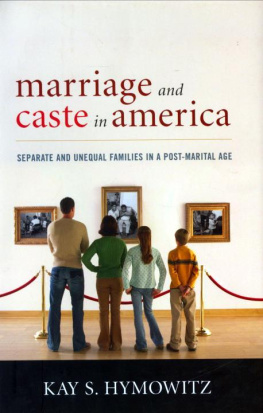While the author of this text is a lawyer, this book only presents general legal information. The author discusses concepts in the hope that they will expand existing law so that married people can get the full benefit of the post-nup solution. While the author practices in Illinois, Wisconsin, and other states (with court permission), this book is not intended to provide specific legal advice for any state. In fact, the law of Illinois regarding many aspects of family law changed dramatically during the writing and editing of this book. The legal information provided in this book cannot substitute for the advice of a licensed professional in your state. Law varies from place to place and it evolves over time, frequently setting new judicial precedents at both the state and federal level. You are urged to seek your own lawyer, who will advise on appropriate actions for your personal situation.
To my wife, Margaret, and my children, Kate and Alex.
Also, to my parents, Lloyd and Dona, who have a few things
to teach people after being married sixty-two years.
Introduction
P OST-NUPTIAL AGREEMENTS , or post-nups as Im going to refer to them throughout these pages, can have an enormously positive effect both on marriages and divorces. They can save troubled relationships by facilitating communication and motivating behavioral change; and when the marriages cant be saved they can make divorces less stressful, less costly, and more fair.
Most of you have heard about pre-nups, but a post-nup is probably an unfamiliar concept. Pre-nups are legal documents entered into before the marriage. Typically, they are used by high-net-worth individuals to protect their wealth; an aging, affluent movie star may insist that his younger, poorer wife-to-be sign a pre-nup that limits the settlement shell receive if the marriage fails. These pre-nups have been subject to a lot of controversy and may be discarded by the courts if they dont meet certain requirements or if someone signed the agreement under duress.
My focus is legal agreements created after the marriage takes placesometimes five, ten, or more years into the marriage. These post-nups serve both spouses rather than one of them, and they have the benefit of being written after couples are aware of the issues that threaten their marriage. Essentially, they are collaborative agreements about areas of conflict and counterproductive marital behaviorsdrinking to excess, infidelity, and more garden-variety transgressionsthat lay out plans to help spouses change these behaviors. To provide motivation to change, the post-nup uses negative sanctionsunfavorable adjustments to maintenance, marital property division, and other settlement issues if spouses dont change and a divorce ensues.
Post-nups consist of three sections: the Action Pact, the Custody Pact, and the Property Pact. The Action Pact is all about conductthe problematic behaviors couples must discuss and one spouse (or both) must change in order to save the marriage. The Custody and Property Pacts are designed to forge agreements on issues such as visitation and division of marital property if the marriage cant be saved.
Post-nups arent new, but they have not been used very often by couples, in part because of a lack of awareness of what they are and the benefits they provide. They also havent been used because in the past, marital issues were simpleras Ill demonstrate throughout the book, the increasing complexity of marriages and divorces makes post-nups far more relevant today than they could have been even ten years ago.
Some courts will be reluctant or constrained by case law or public policy to consider the validity of post-nups. While most states will enforce provisions relating to distribution of assets as long they are fair, some states have hang-ups regarding agreements that mention offending conductuse of drugs, alcohol, infidelity, and the like; those courts oppose these provisions on the theory that they introduce fault into divorce (most courts do not require a determination of fault as a prerequisite to divorce). Another argument against this concept: courts shouldnt inspect private relations between couples. A third objection: discontinuation of illegal drug usage cant be a consideration in an agreement because citizens have a duty not to engage in crimes.
Lets examine the fault objection. Im not arguing for reintroducing fault into divorce, or suggesting the reintroduction of fault into the courts, or asking the court to peep into the bedroom. Instead, Im suggesting that the problems that drive couples to divorce can be placed on a written page and that fair agreements between spouses triggered by conduct should be enforced. Spouses give each other ultimatums dailyfix X or were done.
For instance, a spouse says that if you have another affair/keep drinking/gamble/overcharge our credit card, I will divorce you and see you in court. In a post-nup, the spouse has an agreement with terms for the divorce. Will the judge look at what the parties agreed to when they wanted to save the marriage or ignore that in favor of starting at square one? Will some judges consider accepting conduct triggers (if some case law is against them) when faced with this choice? In states that are hostile to this concept, will legislators think about changing the law to permit such post-nups in the interest of helping marriages survive? In our view, most judges wont want to throw the baby out with the bath water. If the agreement is fairno matter what the triggerjudges will want to consider the terms of the agreement. Despite our belief, some judges in California have done exactly that: refusing to review the terms of the post-nup because conduct was used as a trigger.
A Pennsylvania court, however, believes that post-nups can reflect reality. In the Laudig case, the stated trigger was the wifes infidelity. As the court stated, If... property rights can be transferred without providing any reason to support the transfer, there should be no reason why a transfer would be invalid if it be conditioned on the occurrence of a specified type of conduct.
Post-nups can work even in states that refuse to consider post-nups that mention conduct. If the state does not want to see conduct in writing, then the parties can simply write the post-nup mentioning conduct that is to be addressed without delineating explicit triggers. In some negative-nup states, parties may agree verbally that if X occurs, theyll divorce and then refer to their fair post-nup agreement that they created when they wanted to save the marriage. Pursuing an even more conservative strategy, couples can simply agree to post-nups that are essentially settlement agreements, to be activated if and when they decide to divorce. Since either party always has the right to file for divorce, the post-nup that excludes conduct achieves the same purpose as one that includes it: to have the spouses agree to reasonable terms for their divorce when they still want to make the marriage work.
Other states may be hung-up on whether the post-nup is prepared in contemplation of divorce or whether they are designed to facilitate a reconciliation. Our post-nups are designed to save marriages. They can be named reconciliation agreements in some states and language included specifically to address the concerns voiced in these states.

